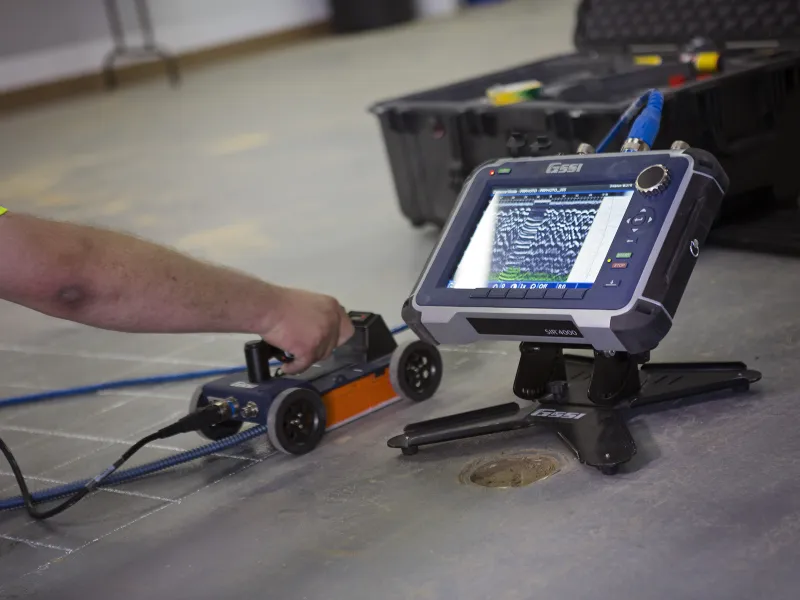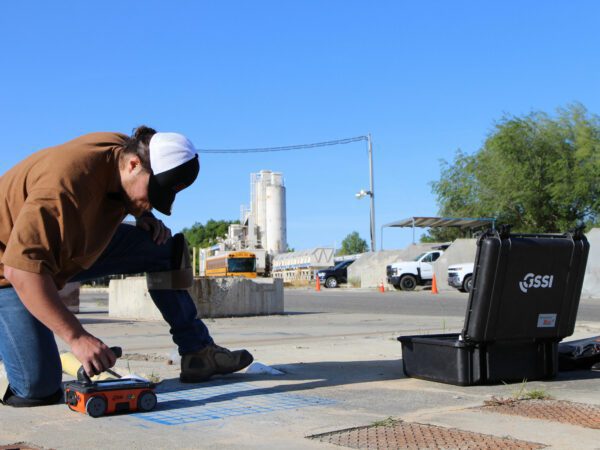Elevate Your Building Refine With the Strategic Insights of Concrete Scanning for Improved Performance
In the world of contemporary building and construction methods, the mission for effectiveness and accuracy is paramount. Accepting cutting-edge modern technologies has actually ended up being a keystone for attaining these goals. One such innovation that has actually reinvented the construction industry is concrete scanning. By using the tactical understandings given by concrete scanning, construction specialists can unlock a world of improved efficiency and streamlined processes. The implications of integrating concrete scanning go far past surface-level advantages, providing a profound influence on project results.

Advantages of Concrete Scanning
Enhancing job effectiveness and security, concrete scanning offers a non-destructive technique for finding concealed objects within concrete structures. By utilizing innovations such as ground-penetrating radar (GPR) and concrete x-ray imaging, building and construction groups can precisely situate rebar, post-tension cable televisions, electrical conduits, and various other blockages before exploration, cutting, or coring right into concrete.
The benefits of concrete scanning are countless. It minimizes the threat of unintentional damage to important architectural components, decreasing the probability of pricey repair work and task delays. Secondly, it improves worker security by giving real-time understandings right into the location of concealed hazards. Building websites can be intricate atmospheres, and understanding what lies under the surface area can avoid crashes and injuries.
Moreover, concrete scanning advertises overall task efficiency by simplifying process and stopping rework. By recognizing potential problems early on, teams can adjust their strategies proactively, saving time and resources in the long run. In significance, the adoption of concrete scanning modern technologies is a strategic investment that pays returns in terms of security, productivity, and cost-effectiveness.
Modern Technology Assimilation for Performance
Concrete scanning's ability to enhance operations and improve project performance can be more maximized via tactical combination of innovative technologies. By including Structure Details Modeling (BIM) software into concrete scanning processes, building groups can attain a greater degree of precision and control. BIM permits the production of 3D designs that give thorough understandings right into the project, allowing far better decision-making and decreasing the possibility of errors. Additionally, the assimilation of Augmented Fact (AR) technology with concrete scanning can improve on-site visualization, allowing task supervisors and employees to overlay electronic details onto the physical atmosphere in actual time. This can assist in much more specific positioning of elements and enhance interaction among employee. The usage of drones for airborne studies in combination with concrete scanning can expedite data collection and evaluation, enabling quicker decision-making and development monitoring. Generally, the calculated assimilation of these technologies can significantly increase efficiency and performance in building tasks.
Preventing Costly Errors
How can meticulous focus to detail throughout concrete scanning processes assist construction groups in preventing expensive mistakes? Concrete scanning plays an essential function in recognizing possible issues before they escalate right into expensive errors. By utilizing innovative scanning technologies such as Ground Permeating Radar (GPR) and electro-magnetic induction, building and construction teams can accurately identify rebar, utilities, gaps, and various other blockages within concrete structures. This degree of accuracy enables task managers to make educated decisions regarding the format and style of their building plans, lowering the threat of unintended damage to critical facilities during the structure procedure. Additionally, concrete scanning aids in guaranteeing architectural honesty by identifying weak points or issues in the concrete beforehand, permitting timely repair work and alterations. By proactively dealing with these problems, building groups can prevent costly errors such as rework, hold-ups, or safety threats that might my website emerge from forgotten inconsistencies in the concrete structure. Ultimately, buying thorough concrete scanning procedures shows to be an economical method over time, conserving both time and resources while improving overall job performance and top quality.
Enhancing Job Administration
Careful focus to information throughout concrete scanning processes not only helps in preventing expensive mistakes however also lays a solid structure for effective Resources task monitoring in building ventures. By including concrete scanning modern technology into task administration techniques, building and construction teams can enhance workflows, boost communication, and make certain that tasks remain on track.
Concrete scanning gives important understandings into the architectural stability of existing elements, allowing job supervisors to make educated decisions regarding style alterations or building series. This proactive approach minimizes the risk of unforeseen delays or remodel, eventually conserving time and sources. Additionally, the data obtained from concrete scanning can be integrated right into Building Details Modeling (BIM) platforms, making it possible for real-time cooperation and sychronisation among various stakeholders.
Furthermore, concrete scanning assists task managers recognize potential risks or obstacles before they rise right into bigger issues, advertising a safer job atmosphere for all involved. With improved presence and accuracy offered by concrete scanning modern technology, project managers can effectively plan, monitor, and perform construction jobs with higher performance and confidence.
Making Best Use Of Efficiency
One vital element of maximizing productivity is with the fostering of concrete scanning technology. By making use of ground-penetrating radar special info (GPR) and various other scanning approaches, building and construction groups can accurately locate rebar, avenues, and various other subsurface components, minimizing the danger of costly errors and delays during excavation and boring.
In addition, accepting Structure Info Modeling (BIM) software application can considerably boost efficiency by developing detailed 3D models that boost project visualization and sychronisation amongst different professions. BIM permits for far better clash detection, allowing problems to be recognized and solved prior to building also starts, saving time and resources over time.
Applying a lean construction strategy, which concentrates on eliminating waste and optimizing effectiveness across all job stages, is one more effective method for making best use of performance. By fostering partnership, interaction, and continuous renovation, building and construction teams can function extra cohesively towards attaining task goals in a structured and productive way.
Final Thought
To conclude, the tactical execution of concrete scanning in the building and construction process provides many benefits, consisting of increased effectiveness, expense financial savings, improved project management, and enhanced performance. By integrating this innovation, building and construction groups can prevent costly mistakes, simplify their operations, and optimize their total project result. Concrete scanning is a useful device that can boost the construction process and lead to even more successful and successful end results.
